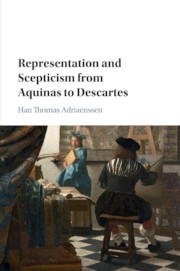Book contents
- Frontmatter
- Contents
- Acknowledgements
- List of Abbreviations
- Introduction
- PART I THE VEIL OF SPECIES
- PART II THE VEIL OF CARTESIAN IDEAS
- 4 Transformations of Cartesianism: Malebranche and Arnauld
- 5 Ideas and Objects in Desgabets's Radical Cartesianism
- 6 The Solid Philosophy of John Sergeant
- PART III REPRESENTATIONS AND SCEPTICISM
- Conclusion
- Bibliography
- Index
6 - The Solid Philosophy of John Sergeant
from PART II - THE VEIL OF CARTESIAN IDEAS
Published online by Cambridge University Press: 13 July 2017
- Frontmatter
- Contents
- Acknowledgements
- List of Abbreviations
- Introduction
- PART I THE VEIL OF SPECIES
- PART II THE VEIL OF CARTESIAN IDEAS
- 4 Transformations of Cartesianism: Malebranche and Arnauld
- 5 Ideas and Objects in Desgabets's Radical Cartesianism
- 6 The Solid Philosophy of John Sergeant
- PART III REPRESENTATIONS AND SCEPTICISM
- Conclusion
- Bibliography
- Index
Summary
In the course of the last years of the seventeenth century, a number of anti-Cartesian publications saw the light, the author of which identified himself as I.S. According to the English Cartesian, Antoine Le Grand, these initials must surely stand for ‘ideistarum spretor’, or scorner of the ideists. As Le Grand knew well enough, however, in reality they stood for John Sergeant (1623–1707), but the nickname was well chosen. For according to this Catholic philosopher, the way of ideas posed a threat, not only to human knowledge of the world, but also to religious stability. In response to this threat, he dedicated the harvest of his career to what was to become one of the most extensive attacks on ideas by an early modern writer to see the light.
As we will see, Sergeant believed that the only way to counter the scepticism inlaid in the Cartesian way of ideas was to return to an account of cognition as formal assimilation that traces back at least to Aquinas. Now, all by itself, the fact that Sergeant should defend such an account of cognition by the end of the seventeenth century need not come as a surprise. Both in and outside of the universities, indeed, many people were still working in a broadly scholastic tradition. What makes Sergeant special, however, is the fact that he systematically presents a return to formal assimilation as an answer to problems that arise within modern theories of knowledge and representation.
In using formal assimilation as a remedy against scepticism, indeed, Sergeant differed, not only from Aquinas himself, but also from some of the early modern Aristotelians closest to him, such as Thomas White and Kenelm Digby. In Sergeant's hand, then, the account of cognition as formal assimilation received a new function, and this raises the question of whether it can indeed carry the weight of the tasks he sees for it. This is a question that we will come back to towards the end of this chapter. But before we can turn to the charge of scepticism that Sergeant levels against the ideists, we first need to look a bit closer at his fear that the way of ideas will lead to religious instability.
- Type
- Chapter
- Information
- Representation and Scepticism from Aquinas to Descartes , pp. 198 - 220Publisher: Cambridge University PressPrint publication year: 2017



